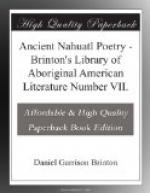NOPAL or NOPALTZIN, 46. Ruler of Acolhuacan, A. D. 1260-1263, according to some chronologies. The name is from nopalli, the cactus or opuntia.
NOPILTZIN, 67, 91. “My son,” or “my lord,” a term of deference applied to superiors, from pilli, which means son and also lord, like the old English child. Cf. Topiltzin.
OTOMIS, 16, 49, 58, 64, 71, 95. A nation which inhabited a portion of the valley of Mexico and region adjacent, entirely dissimilar in language and appearance from the Nahuas. The etymologies suggested are unsatisfactory.
POPOCATEPETL, 46. “The smoking mountain,” the name of a famous volcano rising from the valley of Mexico.
POYAUHTECATL, 105. A volcano near Orizaba (Sahagun. Hist. de Nueva Espana, Lib. I, cap. 21). Derived from poyaua, to color, to brighten.
QUANTZINTECOMATZIN, 41. A warrior not otherwise known. The name is a double reverential, from quani, eater, and tecomatl, vase, “The noble eater from the royal dish.”
QUAUHQUECHOLLAN, 95. A village and plain near the southern base of Popocatepetl. It means “the place of the quechol woods,” or the trees among which quechol birds are found. See Motolinia, Historia de los Indios, Trat. III, cap. 18.
QUAUHXILOTL, 89. Name of a large tree, and applied to a warrior, ruler of Iztapallocan, whom Ixtlilxochitl, King of Tezcuco, placed at the head of his troops in his war with Tezozomoc. See Clavigero, Storia Antica di Messico, Tom. I, p. 185.
QUETZALCOATL, 32, 143, 144. See note on p. 143.
QUETZALMAMATZIN, 91. Name of a warrior, “the noble one of the beautiful hands” (quetzalli, mama, pl. of maitl, and rev. term, tzin). Perhaps the same as Quetzalmemalitzin, ruler of Teotihuacan, mentioned by Ixtlilxochitl, Historia Chichimeca, cap. 35.
QUIAUHTZIN, 93. Name of a warrior, “The noble rain” (quiauitl, tziri).
TENOCHTITLAN, 85. The current name for the City of Mexico; literally, “at the stone-nopal,” from tetl, stone, nochtli, nopal, and postpos., tlan. The term refers to an ancient tradition.
TEPANECAS or TECPANECAS, 35. A powerful nation of Nahuatl lineage, who dwelt in the valley of Mexico. They were destroyed in 1425 by the Acolhuas and Mexicans, and later the state of Tlacopan was formed from their remnants. Comp. probably from tecpan, a royal residence, with the gentile termination.
TEPEYACAC, TEPEYACAN, 93. From tepetl, mountain, yacatl, nose, point, and postpos, c. 1. A small mountain on which the celebrated church of the Virgin of Guadalupe now stands. 2. A large town and state subject to ancient Mexico, now Tepeaca in the province of Puebla.
TETLAPAN QUETZANITZIN, 68, 69. A ruler of Tlatilolco, contemporary of the conquest. See Note to Song VI.




